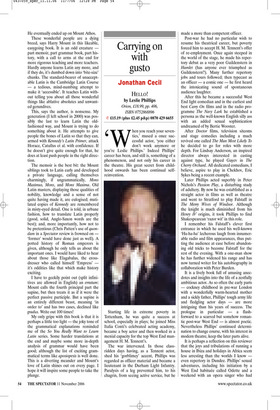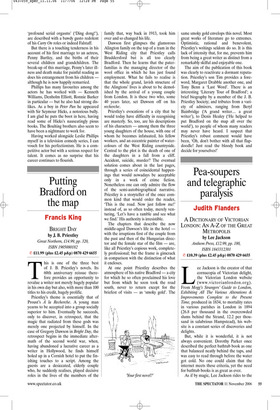Carrying on with gusto
Jonathan Cecil
HELLO! by Leslie Phillips Orion, £18.99, pp. 406, ISBN 0752868896 ✆ £15.19 (plus £2.45 p&p) 0870 429 6655 ‘When you reach your seventies,’ mused a once successful actor, ‘you either don’t work anymore or you’re Leslie Phillips.’ Indeed Phillips’ career has been, and still is, something of a phenomenon, and not only his career in the theatre. His great secret from childhood onwards has been continual selfreinvention.
Starting life in extreme poverty in Tottenham, he was quite a success at school, especially in plays; he joined Miss Italia Conti’s celebrated acting academy, became a boy actor and then worked in a menial capacity for the top West End management H. M. Tennent’s.
The war intervened. In those classridden days having, as a Tennent actor, shed his ‘gorblimey’ accent, Phillips was regarded as officer material and became a lieutenant in the Durham Light Infantry. Paralysis of a leg prevented him, to his chagrin, from seeing active service, but he made a more than competent officer.
Post-war he had no particular wish to resume his theatrical career, but poverty forced him to accept H. M. Tennent’s offer of re-employment. Once again steeped in the world of the stage, he made his repertory debut as a very poor Guildenstern in Hamlet (has anyone ever triumphed as Guildenstern?). Many further repertory jobs and tours followed; then typecast as an officer — a comic one — he first heard the intoxicating sound of spontaneous audience laughter.
After this he became a successful West End light comedian and in the earliest and best Carry On films and in the radio programme The Navy Lark he established a persona as the well-known English silly ass with an added sexual sophistication undreamed of by Bertie Wooster.
After Doctor films, television sitcoms and stage comedies including a much revived one called The Man Most Likely To he decided to go for roles with more depth. For Lindsay Anderson, an inspired director always interested in casting against type, he played Gayev in The Cherry Orchard. All dedicated comedians, I believe, aspire to play in Chekhov, Eric Sykes being a recent example.
Later Phillips acted superbly in Peter Nichols’s Passion Play, a disturbing study of adultery. By now he was established as a straight actor in films as well as theatre and went to Stratford to play Falstaff in The Merry Wives of Windsor. Although the knight is much diminished from his Henry IV origins, it took Phillips to find Shakespearean ‘razor wit’ in this role.
I remember his Falstaff’s clever first entrance in which he used his well-known ‘Ha-ha-ha’ lecherous laugh from innumerable radio and film appearances, thus putting the audience at ease before abandoning old tricks to become Falstaff for the rest of the evening. With a one-man show he has further widened his range and has now turned writer for his autobiography in collaboration with Peter Burden.
It is a lively book full of amusing anecdotes and insights into the life of a zestfully ambitious actor. As so often the early parts — cockney childhood in pre-war London with a wonderfully warm-hearted mother and a sickly father, Phillips’ tough army life and fledgling actor days — are more intriguing than his years of success. The prologue in particular — a flashforward to a scarred but somehow romantic post-war West End — is almost poetic. Nevertheless Phillips’ continued determination to change course, with his interest in modern theatre, keep the later parts alive.
It is perhaps a reflection on this reviewer that the joys and tribulations of running a house in Ibiza and holidays in Africa seem less arresting than the worlds I know even repertory in Dundee. Phillips’ sexual adventures, including his initiation by a West End habituée called Odette and a weekend with an opera singer who had ‘profound serial orgasms’ (‘Ding dong!’), are described with a bawdy gusto redolent of his Carry On roles or indeed Falstaff.
But there is a touching tenderness in his account of his first marriage to an actress, Penny Bartley, and the births of their several children and grandchildren. The break-up of this marriage, Penny’s later illness and death make for painful reading as does his estrangement from his children although he is now happily remarried.
Phillips has many favourites among the actors he has worked with — Kenneth Williams, Denholm Elliott, Ronnie Barker in particular — but he also had strong dislikes. As a boy in Peter Pan he appeared with Sir Seymour Hicks, a notorious bully. I am glad he puts the boot in here, having read some of Hicks’s nauseatingly pious books. The Boulting brothers also seem to have been a nightmare to work for.
Having worked alongside Leslie Phillips myself in a television comedy series, I can vouch for his perfectionism. He is a competitive actor but with a serious respect for talent. It comes as no surprise that his career continues to flourish.



































































































 Previous page
Previous page